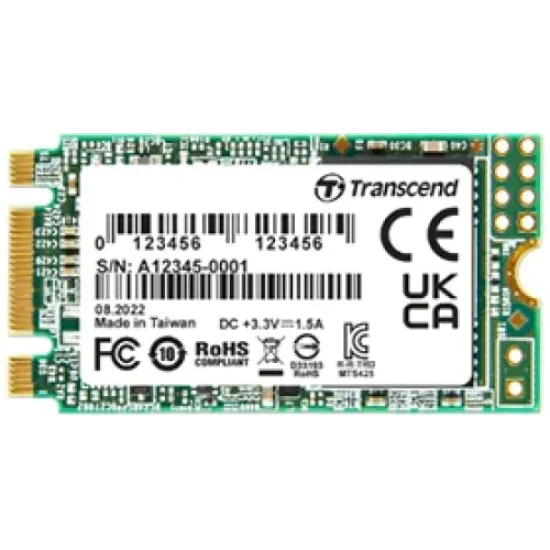
Out Of Stock
Transcend 425S 500GB M.2 2242 SATA SSD
- MPN: TS500GMTS425S
- Capacity: 500GB
- Type: M.2 2242
- Interface: SATA III 6Gb/s
- Sequential Read/Write: Up to 500/330 MB/s
- Stock: Out Of Stock
- Brand: Transcend
- Model: 425S
- MPN: TS500GMTS425S
৳0.00
Ex Tax: ৳0.00
| Key Features | |
| Capacity | 500GB |
| Flash Type | 3D NAND flash |
| Form Factor | M.2 2242 |
| Interface | SATA III 6Gb/s |
| Sequential R/W | up to 500/330 MB/s |
| Physical Specification | |
| Dimension | 42.0 mm x 22.0 mm x 3.58 mm (1.65" x 0.87" x 0.14") |
| Weight | 5 g (0.18 oz) |
| Temperature | |
| Operating Temperature | 0°C (32°F) ~ 70°C (158°F) |
| Warranty Information | |
| Manufacturing Warranty | 03 Years |
Transcend 425S 500GB M.2 2242 SATA SSD
The Transcend 425S 500GB M.2 2242 SATA SSD is suitable for upgrading Ultrabooks and laptops due to its small form factor and high-quality 3D NAND flash. To boost storage reliability and drive lifetime, the SSD has many firmware optimization mechanisms such as SLC caching and an LDPC ECC algorithm. A minor change might make a significant effect. Transcend's M.2 SSD 425S, which has the M.2 standard (42mm), the mainstream SATA III 6Gb/s interface, and a powerful controller, delivers excellent read and write speeds of up to 500MB/s and 330MB/s, respectively, resulting in a 1.5-times faster boot time than traditional hard drives. For intensive graphics and multimedia applications, it provides incredibly rapid loading speeds and nearly instant reaction times. The M.2 SSD 425S is designed to maximize high-performance computing by providing up to 75,000 IOPS for 4k random file read and write rates. For intensive graphics and multimedia applications, it provides incredibly rapid loading speeds and nearly instant reaction times. The M.2 SSD 425S is only 42mm tall, making it ideal for Ultrabooks and lightweight computers. The M.2 SSD 425S is smaller and lighter than normal hard drives, providing a much-needed boost to your computer while saving space. Despite its small size, the M.2 SSD 425S has advanced features that enable data to be stored more reliably enabling the SSD to survive longer.








-250x250.png.webp)
-250x250.png.webp)
